Related Research Articles

The House of Bonaparte is a former imperial and royal European dynasty of Italian (Genoese) origin. It was founded in 1804 by Napoleon I, the son of Corsican nobleman Carlo Buonaparte and Letizia Buonaparte. Napoleon was a French military leader who rose to power during the French Revolution and who, in 1804, transformed the First French Republic into the First French Empire, five years after his coup d'état of November 1799. Napoleon and the Grande Armée had to fight against every major European power and dominated continental Europe through a series of military victories during the Napoleonic Wars. He installed members of his family on the thrones of client states, expanding the power of the dynasty.
Napoleon (1769–1821) also known as Napoleon Bonaparte or Napoleon I, was a French military leader and emperor.

Jérôme-Napoléon Bonaparte was the youngest brother of Napoleon I and reigned as Jerome Napoleon I, King of Westphalia, between 1807 and 1813.

Joseph-Napoléon Bonaparte was a French statesman, lawyer, diplomat and older brother of Napoleon Bonaparte. During the Napoleonic Wars, the latter made him King of Naples (1806–1808), and then King of Spain (1808–1813). After the fall of Napoleon, Joseph styled himself Comte de Survilliers and emigrated to the United States, where he settled near Bordentown, New Jersey, on an estate overlooking the Delaware River not far from Philadelphia.

Lucien Bonaparte, 1st Prince of Canino and Musignano, was a French politician and diplomat of the French Revolution and the Consulate. He served as Minister of the Interior from 1799 to 1800 and as the president of the Council of Five Hundred in late 1799.

Napoleon Bonaparte, later known by his regnal name Napoleon I, was a Corsica-born French military commander and political leader who rose to prominence during the French Revolution and led successful campaigns during the Revolutionary Wars. He was the de facto leader of the French Republic as First Consul from 1799 to 1804, then Emperor of the French from 1804 until 1814 and again in 1815. Napoleon's political and cultural legacy endures to this day, as a highly celebrated and controversial leader. He initiated many liberal reforms that have persisted in society, and is considered one of the greatest military commanders in history. His campaigns are still studied at military academies worldwide. Between three and six million civilians and soldiers died in what became known as the Napoleonic Wars.
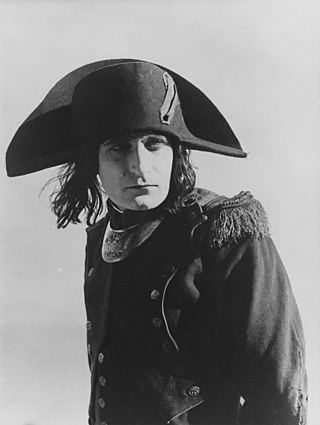
Napoléon is a 1927 French silent epic historical film, produced, and directed by Abel Gance that tells the story of Napoleon's early years. It is also the only film to use Polyvision. On screen, the title is Napoléon vu par Abel Gance, meaning "Napoleon as seen by Abel Gance". The film is recognised as a masterwork of fluid camera motion, produced in a time when most camera shots were static. Many innovative techniques were used to make the film, including fast cutting, extensive close-ups, a wide variety of hand-held camera shots, location shooting, point of view shots, multiple-camera setups, multiple exposure, superimposition, underwater camera, kaleidoscopic images, film tinting, split screen and mosaic shots, multi-screen projection, and other visual effects. A revival of Napoléon in the mid-1950s influenced the filmmakers of the French New Wave. The film used the Keller-Dorian cinematography for its color sequences.
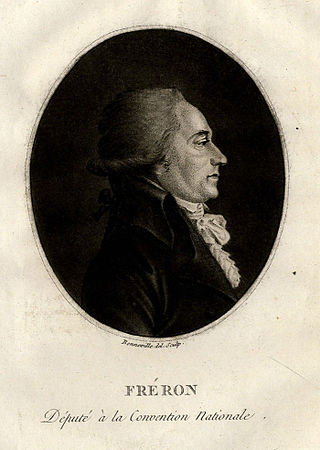
Louis-Marie Stanislas Fréron was a French politician, journalist, representative to the National Assembly, and a representative on mission during the French Revolution.
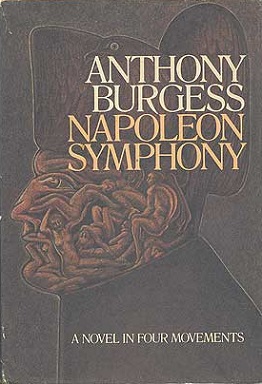
Napoleon Symphony: A Novel in Four Movements (ISBN 0-224-01009-3) is Anthony Burgess's fictional recreation of the life and world of Napoleon Bonaparte, first published in 1974. Its four "movements" follow the structure of Beethoven's Symphony No. 3, known as the Eroica. Burgess said he found the novel "elephantine fun" to write.
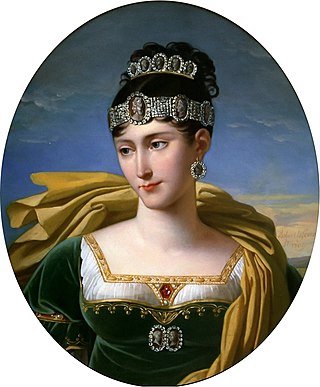
Paula Maria Bonaparte Leclerc Borghese, better known as Pauline Bonaparte, was an imperial French princess, the first sovereign Duchess of Guastalla, and the princess consort of Sulmona and Rossano. She was the sixth child of Letizia Ramolino and Carlo Buonaparte, Corsica's representative to the court of King Louis XVI of France. Her elder brother, Napoleon, was the first emperor of the French. She married Charles Leclerc, a French general, a union ended by his death in 1802. Later, she married Camillo Borghese, 6th Prince of Sulmona. Her only child, Dermide Leclerc, born from her first marriage, died in childhood. She was the only Bonaparte sibling to visit Napoleon in exile on his principality, Elba.
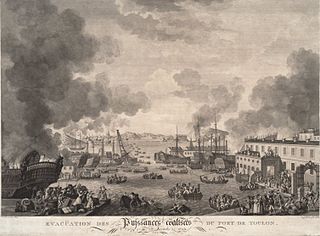
The siege of Toulon was a military engagement that took place during the Federalist revolts of the French Revolutionary Wars. It was undertaken by Republican forces against Royalist rebels supported by Anglo-Spanish forces in the southern French city of Toulon. It was during this siege that young Napoleon Bonaparte first won fame and promotion when his plan, involving the capture of fortifications above the harbour, was credited with forcing the city to capitulate and the Anglo-Spanish fleet to withdraw. The British siege of 1793 marked the first involvement of the Royal Navy with the French Revolution.
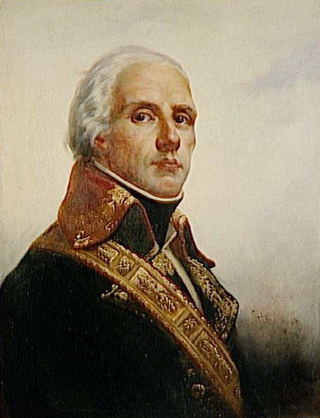
Jacques François Coquille named Dugommier was a French general.
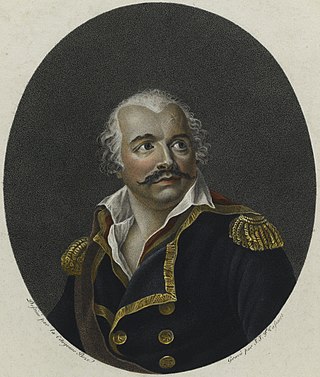
Jean Baptiste François Carteaux was a French painter who became a General in the French Revolutionary Army. He is notable chiefly for being the young Napoleon Bonaparte's commander at the siege of Toulon in 1793.

Désirée is a 1954 American historical romance film directed by Henry Koster and produced by Julian Blaustein from a screenplay by Daniel Taradash, based on the best-selling novel Désirée by Annemarie Selinko. The music score was by Alex North and the cinematography by Milton R. Krasner. The film was made in CinemaScope.

Bonaparte Crossing the Alps is a 1848–1850 oil painting by French artist Paul Delaroche. The painting depicts Napoleon Bonaparte leading his army through the Alps on a mule, a journey Napoleon and his army of soldiers made in the spring of 1800 in an attempt to surprise the Austrian army in Italy. Several versions of this painting exist: in the Louvre- Lens and the Walker Art Gallery in Liverpool, England. Queen Victoria owned a small version of it.
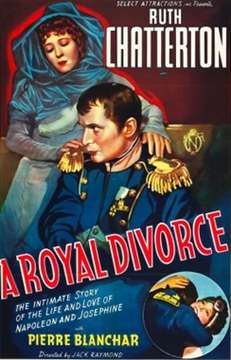
A Royal Divorce is a 1938 British historical drama film directed by Jack Raymond and starring Ruth Chatterton, Pierre Blanchar and Frank Cellier. The film portrays the complex relationship between Napoleon I of France and his wife, Josephine Bonaparte from their first meeting until their divorce more than a decade later. It was shot at Denham Studios in Buckinghamshire. The film's sets were designed by the art director David Rawnsley.
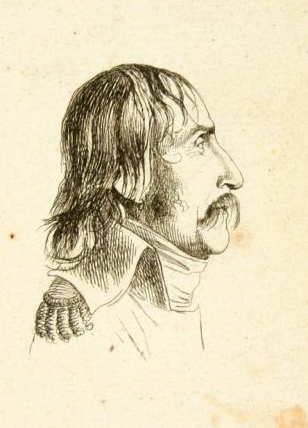
Count of the Empire Pierre-Louis Dupas was a French soldier who rose to prominence during the French Revolutionary Wars, was noted for his association with Napoleon Bonaparte, and rose to the top military rank of General of Division during the Napoleonic Wars. A fiery commander, often noted for bravery, Dupas was often wounded in action, triggering physical infirmities, which eventually forced him to retire from active service, at first temporarily, in 1809 and then permanently, in late 1813.
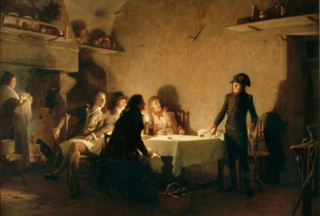
Le souper de Beaucaire was a political pamphlet written by Napoleon Bonaparte in 1793. With the French Revolution into its fourth year, civil war had spread across France between various rival political factions. Napoleon was involved in military action, on the government's side, against some rebellious cities of southern France. It was during these events, in 1793, that he spoke with four merchants from the Midi and heard their views. As a loyal soldier of the Republic he responded in turn, set on dispelling the fears of the merchants and discouraging their beliefs. He later wrote about his conversation in the form of a pamphlet, calling for an end to the civil war.

The Little Napoleon is a 1923 German silent historical comedy film directed by Georg Jacoby and starring Egon von Hagen, Paul Heidemann and Harry Liedtke. It depicts the life and amorous adventures of Jérôme Bonaparte, the younger brother of Napoleon, who installed him as King of Westphalia.
Napoleon is an upcoming epic historical drama film directed and produced by Ridley Scott and written by David Scarpa. It stars Joaquin Phoenix as Napoleon and depicts the French leader's rise to power. The film is scheduled to be theatrically released by Sony Pictures Releasing on November 22, 2023, before streaming on Apple TV+ at a later date.